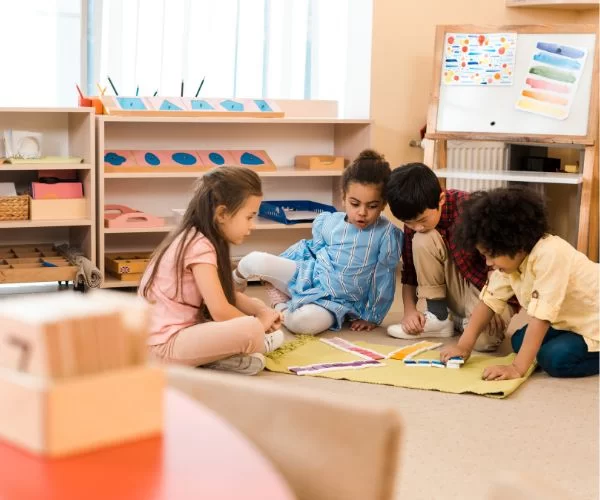When it comes to early childhood education, parents in Texas are faced with a myriad of choices. Two of the most popular options are Montessori schools and traditional preschools. Both have their merits, but they cater to different educational philosophies and learning styles. As parents, understanding these differences is crucial in making the best decision for your child’s development and future success.
Montessori School Approach
The Montessori method, developed by Dr. Maria Montessori over a century ago, emphasizes child-led learning. In a Montessori school, children are encouraged to explore their interests at their own pace, fostering independence and a lifelong love of learning. Classrooms are typically designed to be open and flexible, with various learning stations where children can engage in hands-on activities. Materials are carefully chosen to enhance cognitive and sensory development, and teachers act as guides, offering support rather than direct instruction.
Traditional Preschool Approach
In contrast, traditional preschools often follow a more structured approach to early childhood education. These programs focus on preparing children for the academic demands of elementary school through a teacher-led curriculum. Activities are usually designed to develop specific skills in areas such as literacy, numeracy, and social interaction. The classroom environment is more structured, with set schedules and activities planned out by the teachers. This model emphasizes consistency and predictability, which some children thrive in.
Comparing Montessori and Traditional Preschools
When comparing Montessori schools to traditional preschools, several key differences emerge. One of the most significant is the learning style. Montessori classrooms are child-centered, allowing students to choose their activities based on their interests. This promotes self-discipline and intrinsic motivation. Traditional preschools, on the other hand, are teacher-centered, with a focus on structured learning activities that are the same for all students.
Another difference lies in the classroom environment. Montessori classrooms are typically designed to be free-flowing, with children moving around freely. Traditional preschools often have designated areas for specific activities, with children rotating through these spaces according to a set schedule.
Social development is also approached differently. In Montessori schools, social interaction is encouraged through collaborative activities, with mixed-age classrooms fostering peer learning. Traditional preschools often group children by age and emphasize socialization through teacher-guided activities and play.
Benefits of Montessori Schools in Texas
Montessori schools offer several benefits, particularly for children who thrive in a less structured, more exploratory learning environment. In Texas, the availability of Montessori schools has been growing, making this option more accessible to parents across the state.
Montessori education is known for its ability to cater to individual learning paces, helping children develop not only academically but also socially and emotionally. The emphasis on holistic development and practical life skills makes Montessori a compelling choice for many Texas families.
Benefits of Traditional Preschools in Texas
Traditional preschools also have their strengths, particularly in preparing children for the structure and expectations of elementary school. In Texas, traditional preschools are widespread, with many offering programs that align closely with the curriculum used in public and private schools.
This continuity can make the transition to kindergarten smoother for children. Traditional preschools often emphasize early literacy and numeracy, giving children a solid foundation for their educational journey.
Factors to Consider When Choosing Between Montessori and Traditional Preschool
When deciding between a Montessori school and a traditional preschool, parents in Texas should consider several factors. Your child’s personality and learning style are paramount—some children thrive in the independence of a Montessori environment, while others may benefit from the structure of a traditional preschool.
Long-term educational goals are also important. If you value a child-centered, exploratory approach, Montessori may be the right fit. If you prefer a more conventional educational pathway, a traditional preschool might be more appropriate.
Location and accessibility are also crucial. While Montessori schools are becoming more common in Texas, they may not be available in every area. Traditional preschools, on the other hand, are more widely available across the state, offering more options in terms of location and cost.
FAQs
1. What is the main difference between Montessori schools and traditional preschools?
- The main difference lies in the approach to learning. Montessori schools focus on child-led, self-paced learning, while traditional preschools follow a structured, teacher-led curriculum.
2. Are Montessori schools available throughout Texas?
- Montessori schools are becoming increasingly available across Texas, especially in major cities like Austin, Dallas, and Houston. However, availability may vary in smaller towns.
3. Is Montessori education more expensive than traditional preschool?
- Montessori schools can be more expensive due to the specialized materials and lower student-to-teacher ratios. However, costs vary depending on the school and location.
4. How do I know if Montessori is right for my child?
- If your child enjoys independence, self-directed activities, and exploring new ideas at their own pace, Montessori might be a good fit. It’s helpful to observe a Montessori classroom in action to see how your child responds.
5. Can my child transition from Montessori to a traditional school later on?
- Yes, children can transition from Montessori to traditional schools. The skills gained in a Montessori environment, such as independence and critical thinking, can be beneficial in any educational setting.
Final Thoughts
Choosing between a Montessori school and a traditional preschool is a significant decision that can impact your child’s early education and beyond. Both options have their unique advantages, and the best choice will depend on your child’s needs, your educational philosophy, and what is available in your area of Texas. Visiting schools, observing classrooms, and speaking with educators are essential steps in making an informed decision that will set your child on the path to success.





Lagi cari game seru yang bisa kasih cuan? Yuk main Plinkball hadiah uang jutaan langsung dari HP-mu
hgh x2 gnc
References:
2 iu Hgh fettverbrennung (https://md.swk-web.Com)
dianabol stack cycle
References:
Testosterone Cypionate And Dianabol Cycle (Historydb.Date)
dianabol pct cycle
References:
dianabol only cycle (Virginia)
hgh dose for men
References:
hgh or testosterone for muscle (http://www.easy2france.com)
best steroids for bulking
References:
sam e long term use (nas.zearon.Com)
ipamorelin side effects
References:
cjc-ipamorelin
mk 677 vs ipamorelin reddit
References:
cost of cjc 1295 ipamorelin
ipamorelin dosage morning
References:
how long after taking ipamorelin Can i eat (ajira-hr.com)
tesamorelin + ipamorelin injectable
References:
ipamorelin how much hgh (Clifford)
can i take other supplements with ipamorelin
References:
Valley.md
ipamorelin dosage guidelines
References:
ipamorelin vs hexarelin [https://git.qingbs.com/pabloschreffle]
cjc 1295 no dac + ipamorelin
References:
valley.md
cjc-1295 with dac + ipamorelin + ghrp-2 blend for sale
References:
cjc1295-ipamorelin
cjc 1295 + ipamorelin blend side effects
References:
can you take cjc 1295 dac with ipamorelin
tesamorelin ipamorelin cjc 1295 blend
References:
Ipamorelin Dangers
cjc-1295 & ipamorelin blend for sale
References:
Minimum Dosage Of Ipamorelin For Effectiveness